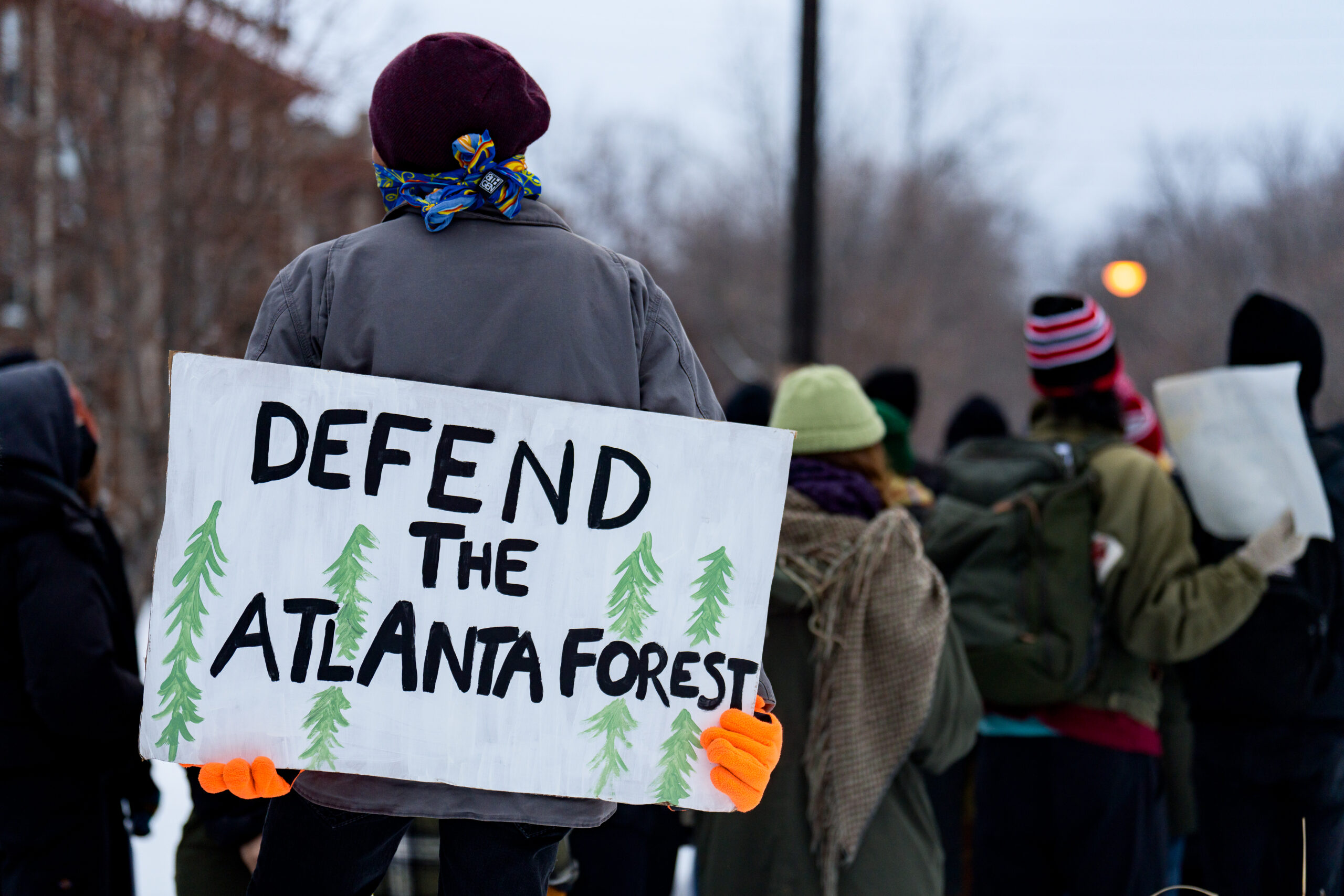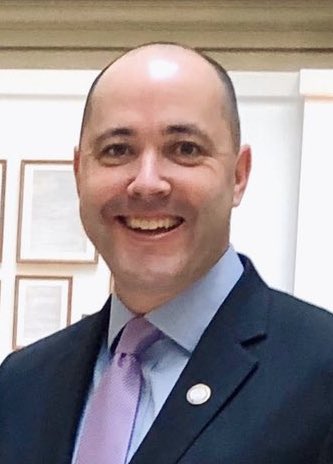and

Protesters in January marching in Minneapolis in remembrance of Manuel Teran, who was shot and killed by officers at a prolonged protest in an Atlanta forest. They stopped at Lake/Girard where protester Deona Marie was killed on June 13, 2021. (Chad Davis, Wikimedia Commons, CC BY 2.0)
By Rachel McKane and David Pellow
The Conversation

 When does lawful protest become criminal activity? That question is at issue in Atlanta, where 57 people have been indicted and arraigned on racketeering charges for actions related to their protest against a planned police and firefighter training center that critics call “Cop City.”
When does lawful protest become criminal activity? That question is at issue in Atlanta, where 57 people have been indicted and arraigned on racketeering charges for actions related to their protest against a planned police and firefighter training center that critics call “Cop City.”
Racketeering charges typically are reserved for people accused of conspiring toward a criminal goal, such as members of organized crime networks or financiers engaged in insider trading.
Georgia Attorney General Christopher Carr is attempting to build an argument that seeking to stop construction of the police training facility – through actions that include organizing protests, occupying the construction site and vandalizing police cars and construction equipment – constitutes a “corrupt agreement” or shared criminal goal.
The indictment’s justification is rooted in long-standing anti-anarchist sentiments within the U.S. government. However, some civil rights organizations call this combination of charges unprecedented.
As scholars who study environmental change and social justice, we believe the charges seek to suppress typical acts of civil disobedience. They also target grassroots community organizing models and ideas rooted in the practice of mutual aid – people organizing collective networks in order to meet each other’s basic needs.
The ‘Stop Cop City’ Movement
“Cop City,” officially known as the Atlanta Public Safety Training Center, was first proposed in 2017. The facility is expected to cost $90 million and is located on 85 acres of public land in the Weelaunee Forest, once home to the Indigenous Muscogee Creek peoples. The site is owned by the city of Atlanta but sits on unincorporated land in DeKalb County, just outside the city.
The opposition campaign has garnered support from activists and environmentalists who are concerned about militarization of police forces and potential threats to the Black community, as well as to climate resilience in Atlanta.
Members of Defend the Atlanta Forest, a decentralized movement of grassroots groups and individuals, argue that the threatened forest provides essential ecological services – filtering rainwater, preventing flooding, providing habitat for wildlife and cooling the city in a time of climate change.
Activists have led protest marches, written letters to elected officials and organized a referendum for the public to decide the future of the property. Some have camped out in the Welaunee Forest – a method that radical environmental defense groups like Earth First! have used to delay or prevent logging. In one instance, activists reportedly set construction equipment on fire.

Carr has filed a sweeping RICO indictment against dozens of activists protesting the planned police training site. (U.S. Senate, Wikimedia Commons, Public domain)
Authorities have responded with force.
In January 2023, police fatally shot activist Manuel “Tortuguita” Terán, who had been camping on the Cop City site for months. Authorities assert that Terán had shot and wounded a state trooper, while Terán’s family contends that they were protesting peacefully.
An independent autopsy concluded that Teran was shot 57 times while sitting with hands raised. A prosecutor opted not to file charges against state troopers involved in the shootout, calling their use of deadly force “objectively reasonable.”
Attorney General Carr indicted 61 activists on Sept. 5 under Georgia’s Racketeer Influenced and Corrupt Organizations Act, which is a broader version of the 1970 federal RICO law.
Three defendants have been charged with money laundering for transferring money to protesters occupying the forest around the construction site. Five are charged with domestic terrorism and arson. Some of the accused face up to 20 years in prison.
Clashes between protesters and police have continued. Protesters organized a march for Nov. 13 and were met by heavily armed police officers in riot gear. When activists attempted to push past the officers, the police used tear gas and flash-bang grenades.
Son of a-
Are the protestors in a phalanx formation. https://t.co/Q9lTiRP2Ry— Nolan ? (@VoidOfRoses) November 13, 2023
How Does RICO Apply?
Georgia’s 109-page indictment of “Cop City” protesters paints a broad – and, in our view, troubling – picture of the actions and beliefs that allegedly contributed to what it describes as a corrupt agreement.
The indictment cites the 2020 killing of George Floyd by Minneapolis Police as the event that sparked the “conspiracy.” It refers to the Atlanta-based movement as the Defend the Atlanta Forest “Enterprise” and describes participants as engaging with “anarchist” ideas and practices such as “collectivism, mutualism/mutual aid, and social solidarity.”
Protesters use these practices, the indictment asserts, to advance their goal of stopping construction of the training center. As evidence, it cites examples, including posting calls to action on online blogs, reimbursement for printed documents and transferring money to activists for materials such as camping gear, food, communications equipment and, in two instances, ammunition.
Threatening First Amendment Rights
As we see it, these activists are being criminalized for their political beliefs and for engaging in activities protected by the First Amendment, such as exercising free speech. Throughout the indictment, the Georgia attorney general uses the term “anarchist,” we believe, as a synonym for “criminal.”
The Cop City RICO arraignments were chaotic and scary and, I fear, coming to a courtroom near you as all movements for a better world are increasingly criminalized. https://t.co/QpLVqm2GNu
— Hannah Riley (@hannahcrileyy) December 1, 2023
Such language echoes the Immigration Act of 1903, also known as the Anarchist Exclusion Act. This law targeted anarchists for exclusion from the U.S. solely based on their political beliefs. Section 2 of the law states that “anarchists, or persons who believe in or advocate the overthrow by force or violence of the government of the United States or of all governments or all forms of law, shall be excluded from admission into the United States.”
This wording reflects a widespread view of anarchy as a state of violent disorder. In fact, however, many anarchist thinkers actually proposed to organize society on the basis of voluntary cooperation, without political institutions or hierarchical government.
Another, broader view of anarchy is that it is an ideology and practice of organizing communities and society in ways that confront any and all forms of oppression, including oppression by government.
Carceral capitalism is not an idea or a pattern of thoughts.
It is a list of addresses, a coordination of forces, of institutions, tools, methods, tactics, infrastructures, conferences, contracts, policies, images.
It lives on earth, just like us, and it can be deposed here.
— Defend the Atlanta Forest (@defendATLforest) November 20, 2023
Why would such a philosophy be deemed threatening? Consider recent U.S. history.
The Black Panthers
In the late 1960s and early 1970s, the federal government sought to repress and criminalize the Black Panther Party for Self Defense as part of a covert and illegal counterintelligence program, known as COINTELPRO.
The Black Panther Party created extensive community survival and mutual aid programs for Black communities at a time of ongoing government neglect. Offerings included free access to medical and dental clinics, ambulance service and buses to visit friends and relatives in prison.
The Black Panther Party organized dozens of social programs to directly meet local needs in underserved areas like New York’s South Bronx.
The Black Panthers’ free breakfast for children program fed thousands of children across the country. In Chicago, local police destroyed food the night before the program was set to begin operations. A memo by an FBI special agent called the program an attempt to “create an image of civility” and “assume community control,” thus threatening the centralized authority of the U.S. government.
Federal agencies relied mainly on covert tactics to surveil, infiltrate and discredit the Black Panther Party. Like the Cop City protesters, the Black Panthers also engaged in direct confrontations with police.
However, we see the current use of RICO charges to address political activism and protest activities as a new tactic.
Future Implications
In our research, we have explored how mutual aid groups establish networks of care and survival in the face of climate change. We expect mutual aid to become even more important for Black and Indigenous people of color as environmental disasters become more frequent.
From our perspective, efforts to stop Cop City demonstrate the interconnection between two critical issues: overpolicing of communities of color and climate change. We see Georgia’s RICO indictment as an attempt to repress social movement activity, using the state’s tools of legal interpretation and enforcement.
Criminalizing collectivism, mutual aid and social solidarity is particularly concerning for historically marginalized populations, who often rely on these tactics for survival.
Seeking to use the state’s political processes, organizers recently collected over 116,000 signatures supporting a ballot referendum that, if approved, would cancel the lease of the city-owned site for the training center.
However, Atlanta officials have refused to verify those signatures as they await a federal court ruling on whether the organizers missed a key deadline. Meanwhile, Atlanta is already clearing land for construction at the training site.![]()
Rachel McKane is assistant professor of sociology at Brandeis University.
David Pellow is department chair and professor of environmental studies and director, Global Environmental Justice Project, University of California, Santa Barbara.
This article is republished from The Conversation under a Creative Commons license. Read the original article.
The views expressed are solely those of the authors and may or may not reflect those of Consortium News.

It should not be lost on us how Hamas has mirrored the Black Panthers in their community service and their leaders targeted for assassination for doing so. Governments behaving as a protection racket for the criminal wealthy class show who they truly represent when they target oppressed communities for daring to fight back against their oppressors. The answer is obviously the necessity of abandoning capitalism as an economic system in favor of socialism.
When organizing for redress of grievances is made a crime actively prosecuted by the state, the ‘state’ is no longer of and for the people, but is only an authoritarian institution fully committed to a plutocracy. We have been moving in that direction, increasingly, for several decades. The illusion that the US is somehow exceptional in its political designs supporting human and civil rights has become clear to all but US Americans.
A key point which is missing from the above article is that the forest where the construction is taking place was given to the city of Atlanta on the basis it would be preserved and not developed. It is the largest forest in any city in the United States.
Local community activists sued the city over the clearing of the protected land as it is technically illegal to develop it.
Furthermore, the execution of the peaceful protester Manuel Tortuguita was caused by a police “friendly fire” incident where an officer accidentally discharged their own firearm into their leg.. it’s not know. What exactly led to the execution of Manuel because the body cam footage has not been released.
Seems like “business as usual” for American police, who have a penchant for murdering people with impunity…